Papers by Blake P McCabe
Academia Letters, 2021
This preliminary quantitative study uses surveying and analysis via SPSS to determine the efficac... more This preliminary quantitative study uses surveying and analysis via SPSS to determine the efficacy and need of in-depth research on possible conflicts international students face conflict both academically and socially. This research verifies that students need help with adjusting to college in the USA and that further study is necessary to understand and meet the needs of international students. Steps need to be taken to help teach US students about the cultural background of international students as well as cultural misconceptions internationals have about the US. From this study, universities can ascertain direction for developing methods to assist international students.
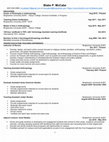
Anthropology CV, 2021
Present Develop, design, and teach online courses focused on religious studies, pluralism, anth... more Present Develop, design, and teach online courses focused on religious studies, pluralism, anthropology, secularism, politics, government, and global interdependencies Courses include Political Anthropology, Legal Anthropology, and Anthropology of Science Fiction and Religion Lecture via Panopto with interactive content, such as quizzes and small critical thinking assignments, to guide students towards a deeper understanding of interdependencies between religion and politics globally Create and build course content via blackboard to supplement course lectures Create syllabi and grade assignments Courses run every summer and some winters Teaching Assistant Anthropology Binghamton University SUNY February 2021-Present Grade assignments Provide supplemental materials for course topics for students Moderate discussion board Graduate Assistant Asian American Studies Binghamton University SUNY August 2020-December 2020 Grade assignments Provide supplemental materials for course topics for students Moderate discussion board Maintain attendance Teaching Assistant Judaic Studies Binghamton University SUNY August 2019-December 2019 Grade assignments Provide supplemental materials for course topics for students Moderate discussion board Hold office hours Develop material for exams Proctor exams Facilitate and teach topic reviews and exam prep Adjunct Lecturer, Israel Studies Binghamton University SUNY Jan 2019-May 2019 Advise and guide students on developing civic engagement projects that connect to their career, academic and personal interests, including assisting students with identifying their skills and interest and connecting them to their degree plan Educate and advise students about programs and opportunities on campus
Teaching Documents by Blake P McCabe
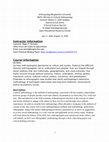
Surveys anthropological approaches to culture and society. Explores the different theories anthro... more Surveys anthropological approaches to culture and society. Explores the different theories anthropologists use to understand how peoples' lives are shaped through social relations that vary historically, geographically, and cross-culturally. Key topics covered include political economy, history, colonialism, kinship, gender, expressive culture, material culture, politics, economics, and globalization. Emphasis on ethnographic case studies that clarify anthropology's distinctive methodology of participant observation and long-term fieldwork. Sociocultural anthro foundations course. Description Cultural anthropology is the subfield of anthropology concerned with the complex relationships between groups of people and the social and cultural circumstances in which they live, work and play. This introduction to the field examines anthropological attention to the concept of culture and invites students to engage with culture in their own lives and through cross-cultural experiences. In order to consider how anthropology offers alternative strategies in the analysis of current events, this course will review anthropological methods and methodology, particularly ethnography, along with various anthropological theories and practices, to arrive at suggestions as to how social anthropology is a vital, relevant and applicable social science today. Students will learn about the history of the field, how anthropologists past and present study culture, and will embark on their own ethnographic undertakings through a short video blog project and critical thinking activities. Course Format and Procedures This course will be using the online asynchronous model for the Summer 2022 semester. This means Online Asynchronous-You will access the course content on Brightspace at a time of your choosing. However, there will be activities, assignments, and assessments that have specific due dates as listed in the course schedule. General Education Information Include general education information for this course, if applicable. General Education Guidelines and Learning Outcomes are available at Binghamton University: General Education: Guidelines Course Requirements Required text All textbooks and required readings are available either open-source online or through the Library Course Reserves. Both books below can be accessed free online. All course readings are open-sourced online and free.
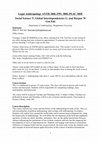
Tuesdays 2-4pm IN-PERSON in my office, starting Feb 15th. Feel free to just swing by my office du... more Tuesdays 2-4pm IN-PERSON in my office, starting Feb 15th. Feel free to just swing by my office during that time without an appointment. If someone has reserved a slot for a private meeting, I will put a sign on the door. Fridays 10am-noon on ZOOM and by appointment only-This means I won't be in my physical office but will be available to meet via zoom, just let me know to set aside a 15-30min slot for you Zoom office hours starting Friday, Feb 11th will be with the following link: https://binghamton.zoom.us/j/4280307116 Make sure to let me know to reserve a slot for you I know a few people still couldn't do any of those times. If you want to meet and those don't work for you, let me know. I can try to find another time to during the week to meet in-person or via zoom with you. Office: Science 1, Anthropology side, floor 2, room 209 (it's in a side hallway with Dr. Josh Reno's office) Course Format: This is a traditional in-person 15-week course. The class will meet in-person each week for lecture and discussion. Students will be responsible for completing readings, class participation, and homework. The course will be in-person Tuesday and Thursdays from 11:40am-1:05pm. Tuesdays are dedicated to lecture and Thursdays will be a mix of lecture and discussion. Class meets in Science Library, room 306. Course Description: This course explores key issues and the history of the anthropological study of law. This is a sub-concentration of political anthropology and overlaps with anthropology of religion. Students will explore laws around the world today and in ancient times comparatively, using the frameworks of anthropology. We will follow the development of the field and emphasize questions of what are ethics, morality, and justice, how are the global interactions between cultures influencing the institutions of law in those countries and how has this impacted the development of views of international law. Students will engage with issues of colonialism, influences of religious belief and law on government, the local scale versus the national scale, and concepts of universal human rights and justice in the context of modern international
Political Anthropology Syllabus, 2021
This is a 5-week online course. Students are expected to complete the weekly readings, watch the ... more This is a 5-week online course. Students are expected to complete the weekly readings, watch the video lectures, and complete the weekly and course assignments. It is not possible to complete the weekly essay assignments without watching the video lectures AND doing the readings.
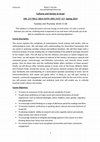
Syllabus Cultures and Society in Israel, 2019
Course Description:
This course explores the complexity of contemporary Israeli cultures and soci... more Course Description:
This course explores the complexity of contemporary Israeli cultures and society, with an anthropological lense. We will begin with understanding the theoretical frameworks that are useful in analyzing complex cultural and political situations. We will then begin with a historical analysis of Israel, leading into an understanding of the political and legal structure of the modern state. This will lead us into the influence and basics of Jewish religious law. From there, we will explore the variety of cultures of the country, focusing on minority and contested groups: intermarriage, non-Orthodox conversions, and minority ethnic Jewish groups. How do these laws and the conflicting beliefs affect members of these groups? Finally, we will discuss other minority groups in Israel, such as the Druze, Bedouin, Bahai, and Christian Arabs. During this course, you will pursue research projects that will deepen your familiarity and understanding of a sociocultural question pertaining to Israel, and its interconnectedness with expats and global Jewry. In doing so, you will gain training in research, community engagement, writing and presentation skills. By the end of this course, you will possess basic knowledge and analytical tools that will enable you to critically examine Israeli cultures and society.
Conference Presentations by Blake P McCabe
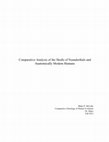
Proceedings of the 44th Annual Meeting Commonwealth of Pennsylvania University Biologists (CPUB), 2013
Fossil evidence shows that Neanderthals and Anatomically Modern Humans vary in aspects of the si... more Fossil evidence shows that Neanderthals and Anatomically Modern Humans vary in aspects of the size and shape of their skulls. The similarities and differences between these two hominid species are observable and measurable based on current fossils of Neanderthals and of the skulls of Modern Humans. Neanderthals had thick bones that show that they were large and muscular. They had a larger brain capacity than that of Modern Humans. The overall cranial shape of the two species also differed. Whilst there is variation within all species, the range of size and shape can be seen to be distinctly different between the two species. The difference in the skulls can be seen also by looking at the cranial base. Neanderthals have wide cranial bases, which lends to wider skulls. Looking just at cranial bases would not identify brain capacity, however. By looking at the difference in the cranial bases and the Occipital bone between the two species the differences in the overall skull can be understood as well. Through fossil evidence it can be deduced that Neanderthals reached adulthood at a different age than Modern Humans and that their bodies were adapted to the cold climate during the time they populated Europe. Through fossil evidence of skulls of Neanderthals and the comparison to the skulls of Anatomically Modern Humans these variations have and can be observed and measured.











Uploads
Papers by Blake P McCabe
Teaching Documents by Blake P McCabe
This course explores the complexity of contemporary Israeli cultures and society, with an anthropological lense. We will begin with understanding the theoretical frameworks that are useful in analyzing complex cultural and political situations. We will then begin with a historical analysis of Israel, leading into an understanding of the political and legal structure of the modern state. This will lead us into the influence and basics of Jewish religious law. From there, we will explore the variety of cultures of the country, focusing on minority and contested groups: intermarriage, non-Orthodox conversions, and minority ethnic Jewish groups. How do these laws and the conflicting beliefs affect members of these groups? Finally, we will discuss other minority groups in Israel, such as the Druze, Bedouin, Bahai, and Christian Arabs. During this course, you will pursue research projects that will deepen your familiarity and understanding of a sociocultural question pertaining to Israel, and its interconnectedness with expats and global Jewry. In doing so, you will gain training in research, community engagement, writing and presentation skills. By the end of this course, you will possess basic knowledge and analytical tools that will enable you to critically examine Israeli cultures and society.
Conference Presentations by Blake P McCabe
This course explores the complexity of contemporary Israeli cultures and society, with an anthropological lense. We will begin with understanding the theoretical frameworks that are useful in analyzing complex cultural and political situations. We will then begin with a historical analysis of Israel, leading into an understanding of the political and legal structure of the modern state. This will lead us into the influence and basics of Jewish religious law. From there, we will explore the variety of cultures of the country, focusing on minority and contested groups: intermarriage, non-Orthodox conversions, and minority ethnic Jewish groups. How do these laws and the conflicting beliefs affect members of these groups? Finally, we will discuss other minority groups in Israel, such as the Druze, Bedouin, Bahai, and Christian Arabs. During this course, you will pursue research projects that will deepen your familiarity and understanding of a sociocultural question pertaining to Israel, and its interconnectedness with expats and global Jewry. In doing so, you will gain training in research, community engagement, writing and presentation skills. By the end of this course, you will possess basic knowledge and analytical tools that will enable you to critically examine Israeli cultures and society.